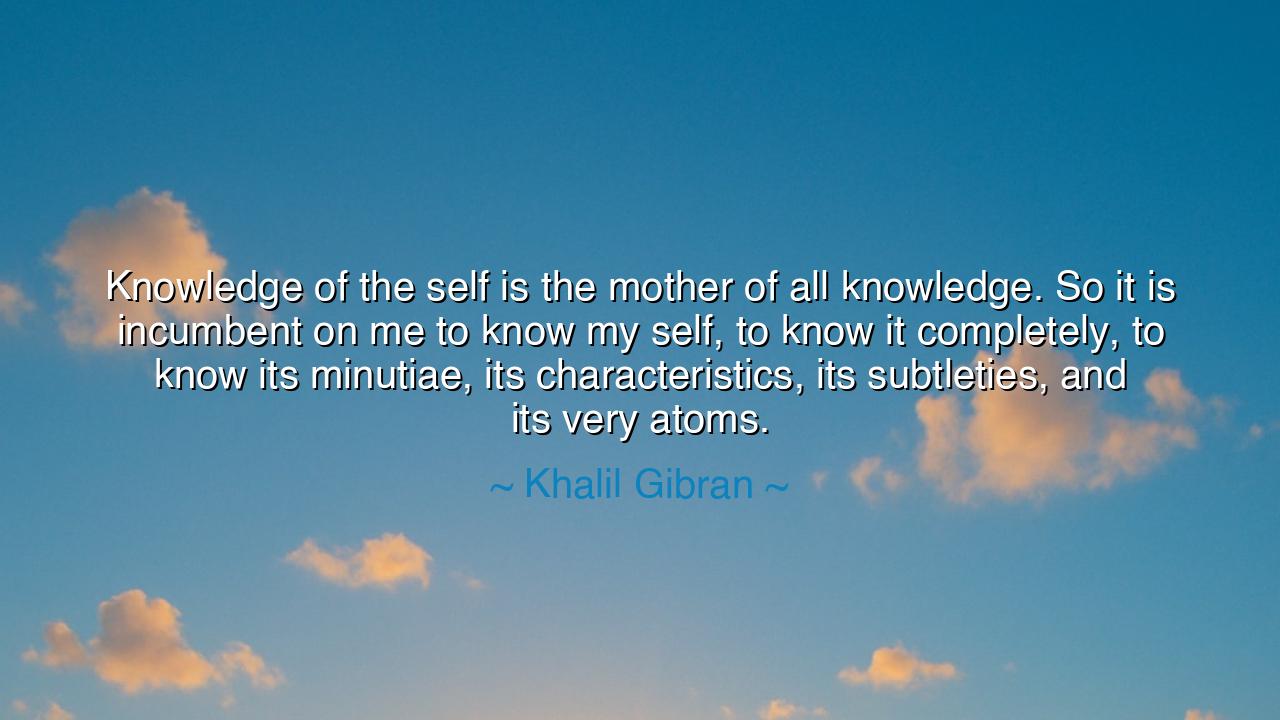
Knowledge of the self is the mother of all knowledge. So it is
Knowledge of the self is the mother of all knowledge. So it is incumbent on me to know my self, to know it completely, to know its minutiae, its characteristics, its subtleties, and its very atoms.






“Knowledge of the self is the mother of all knowledge. So it is incumbent on me to know my self, to know it completely, to know its minutiae, its characteristics, its subtleties, and its very atoms.” — Khalil Gibran
Listen well, O seeker of truth and child of the eternal, for in these words Khalil Gibran speaks the oldest and greatest commandment ever given to humankind: Know thyself. He calls this knowledge of the self the mother of all knowledge, for from it all wisdom is born. Before man can grasp the mysteries of the stars, he must first comprehend the depths of his own soul. Before he can master the world, he must first master his mind. To Gibran, the self is not a single surface to be seen and named — it is an ocean with countless depths, a labyrinth of light and shadow, strength and weakness, passion and stillness. And until one knows that inner realm, all other knowledge is but noise — echoing without meaning.
The origin of this thought flows from the wellspring of the mystics and philosophers who came before him — from the Delphic oracle’s ancient inscription, “Know thyself,” to the meditations of the Sufis and the teachings of the prophets. Gibran, a poet of Lebanon who walked between the East and West, drew from both the desert and the dawn. He saw that men built cities, studied the heavens, and conquered nations — yet remained strangers to their own hearts. He saw that civilization without self-knowledge leads not to enlightenment but to emptiness. And so he wrote: It is incumbent on me to know my self completely — not as vanity, but as sacred duty, for the self is the vessel through which we perceive all creation.
For how can one truly understand others if one does not first understand oneself? How can one speak of love without knowing the roots of one’s own longing? How can one preach truth while being blind to the illusions that rule the inner world? Gibran’s wisdom reminds us that all knowledge, whether of science or of spirit, must begin with awareness — the clear, fearless gaze turned inward. When man knows his thoughts, he masters his speech. When he knows his desires, he governs his actions. When he knows his pain, he becomes compassionate. Thus, to know the self is to hold the key to understanding all things.
Consider the story of Gautama Buddha, who abandoned his palace, his family, and his crown, not to escape the world but to discover himself. Surrounded by luxury, he saw that comfort could not silence the questions burning within. In the wilderness, he confronted his fears, his pride, his hunger, and his sorrow. He searched not for gods in the heavens, but for truth within his own being. And when at last he looked deeply into himself, he found enlightenment — not as something added, but as something uncovered. His journey was the very echo of Gibran’s words: to know the self completely, down to its “very atoms,” is to awaken to the divine that dwells within.
But the path of self-knowledge is neither swift nor easy. It demands silence in a noisy world, courage in the face of one’s own shadows, and humility before the vastness of the soul. To look within is to meet both the angel and the beast, both the storm and the calm. Many turn away, fearing what they might see — but the wise persevere. For within every flaw lies understanding, and within every wound lies a doorway to compassion. Gibran teaches that when we come to know ourselves — our weaknesses, our motives, our contradictions — we no longer stumble through life as strangers, but as beings awake, whole, and free.
The lesson is this: seek first to know yourself, for all other knowledge flows from that well. Observe your thoughts as they arise, question your desires, understand your fears. Sit in solitude, not as one abandoned, but as one returning home. Do not fear what you find — whether pride or pain — for to know it is to begin to transform it. And as you learn to understand your own nature, you will find that understanding radiates outward like sunlight — illuminating the hearts of others, revealing the unity beneath all difference.
So, my child, remember Khalil Gibran’s wisdom: “Knowledge of the self is the mother of all knowledge.” The stars may teach you wonder, and the books may teach you reason, but only the mirror of the soul will teach you truth. To know yourself completely is to awaken to the divine breath that lives within you. Look inward until you see clearly — not the mask you wear, but the eternal light that burns behind it. For when you truly know yourself — your subtleties, your depths, your very atoms — you will see that you are not separate from the world, but one with it. And in that realization, you will hold in your heart the secret of all wisdom.






AAdministratorAdministrator
Welcome, honored guests. Please leave a comment, we will respond soon